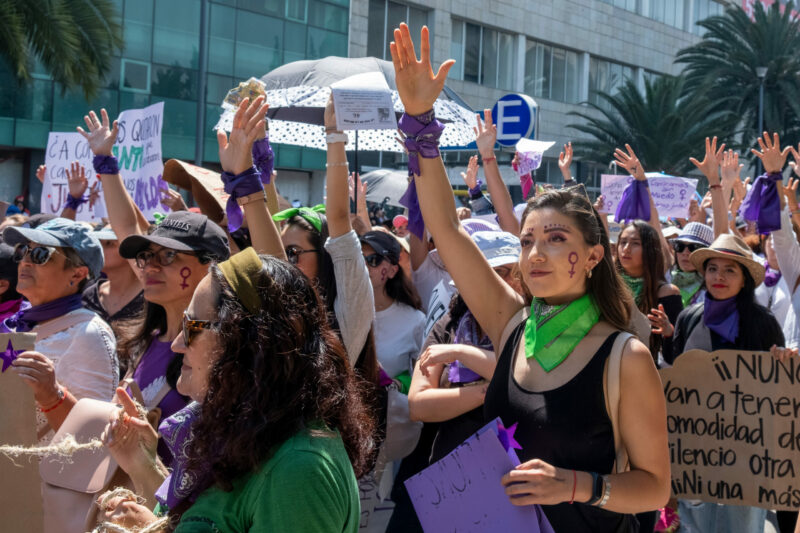Three years ago, Mexico became the first nation in the Global South to adopt a Feminist Foreign Policy. Has politics become more feminist since this announcement? Daniela Philipson Garcia, co-founder of the Mexican platform Internacional Feminista, evaluates the outcomes of the country’s decision.
In 2019, at the United Nations General Assembly, Mexico’s Foreign Affairs Minister, Marcelo Ebrard, announced that Mexico would become the first nation in the Global South to adopt a Feminist Foreign Policy. Since then, Mexico has become a gender equality champion in some multilateral fora, such as the G20 and COP25. According to the Foreign Affairs Secretariat, in response to a freedom of information request filed by Internacional Feminista, Mexico participated in 23 and 26 events related to gender equality in 2020 and 2021, respectively. Mexico also co-hosted, along with France, the Generation Equality Forum, the first multinational forum since 1995 to specifically address the current state and future of gender equality around the globe.
However, in other spaces, Mexico’s silence on gender equality has been conspicuous. It is crucial that Feminist Foreign Policies embrace a genuine mainstreaming strategy that tackles gender equality comprehensively across issue areas, such as trade, defense, and development aid. Furthermore, Feminist Foreign Policies should not prioritize global concerns at the expense of the local problematics.
One of the spaces in which Mexico has remained silent on gender equality is the Security Council. Despite being a non-permanent member of the Security Council for 2021-2022 and co-charing the Informal Experts Group on Women, Peace, and Security, Mexico rarely mentioned gender. Neither did it figure in its agenda, when Mexico presided over the Council in November 2021, although the issues addressed largely overlap with gender inequality. These topics included preventive diplomacy; exclusion, inequality, and conflicts; and small arms and light weapons.
Mexico’s approach to Feminist Foreign Policy has been to cherrypick the issues that will give it the most mediatic attention and help brand it as a progressive country in the international and diplomatic sphere. Paying lip service to gender equality while disregarding actionable public policies that improve women’s material wellbeing is not unique to Mexico. For example, France’s Feminist Foreign Policy is solely reserved for its diplomacy realm and is not mainstreamed across other its foreign and domestic policies as a whole.
Mexico ignores the gender-related crisis at home
Mexico’s Feminist Foreign Policy has largely been criticized for one omission, specifically. While Mexico says it seeks to promote gender equality abroad, it ignores the gender-related crisis at home. Gender-based violence in Mexico is ubiquitous and governmental solutions are lacking and negligent. Feminist grassroots organizations in Mexico have conducted original research proving that an increase in military presence leads to more violence against women. For example, they found that militarization leads to an increase in homicides of women with firearms.
However, despite feminist activists’ anti-military demands, the Federal government has continued to grow the military’s spending and responsibilities in everyday life. The military in Mexico is currently tasked with border control and public safety, among other public services that previously fell under the jurisdiction of civilian authorities. Since 2018, military spending in Mexico has increased by 11 per cent, reaching a historic high of 113 billion pesos (approximately 5.7 billion US-Dollar) in 2021. A significant portion of these funds has been destined for the National Guard, which is responsible for stopping immigrants and refugees from crossing Mexico’s borders and has been involved in numerous human rights violations.
This myopic approach to gender equality is also present in Canada’s Feminist Foreign Policy, which prioritizes funding for advancing gender equality abroad but does little to address the high levels of domestic violence against Indigenous women in its own country. Honing in on gender inequality abroad while disregarding it locally is particularly problematic for countries in the Global North who continue to frame development and human rights shortcomings as unique to the Global South. This perspective enhances negative stereotypes about developing countries and ignores the role played by wealthier, colonialist countries that stifled growth in the countries they invaded and plundered.
The Women, Peace and Security (WPS) Agenda, which emanates from the 1325 United Nations Security Council Resolution in October 2010, is pivotal for conceptualizing a Feminist Foreign Policy. The WPS Agenda was passed due to feminist civil society’s lobbying and advocacy. Through unrelenting activism, feminists proved that armed conflict has differing effects on women and girls. Thus, arguing that solutions to prevent, protect, and represent conflict-related violence against women and girls require a gender perspective of armed conflict and post-conflict situations.
No strategic plan or policy roadmap exists as yet
Nations with a Feminist Foreign Policy should align their values with the WPS Agenda, tailoring it to local contexts. This has not been the case in Mexico. Although the Mexican Foreign Affairs Secretariat calls for an intersectional, gendered perspective in its foreign policy, Mexico’s National Action Plan on WPS does not address disability, race, ethnicity, sexual orientation, or gender identity. Moreover, it underscores militaristic, band-aid solutions (i.e. recruiting more women in the Mexican Military) to ending conflict and excludes civilian and women-led alternatives for peace, betraying the original, feminist spirit of the WPS Agenda.
Since 2019, Mexico’s Foreign Affairs Secretariat has not published a formal strategic plan or a policy roadmap that clarifies its goals, indicators, or budget, obfuscating its true purpose, as well as its actual impact. Overall, gauging the impact and added value of Mexico’s Feminist Foreign Policy is a daunting, nearly impossible task. In this light, we must ask ourselves: What is the purpose of a Feminist Foreign Policy? And is a Feminist Foreign Policy possible under patriarchal government structures without the participation of feminist civil society? The truth is there are no transparent, accountability mechanisms that allow researchers, advocates, and constituents alike to monitor and evaluate the outcomes of Mexico’s Feminist Foreign Policy. Without these instruments and without the active participation of feminists, Mexico’s Feminist Foreign Policy exists in name only.
Daniela Philipson Garcia lives in New York City and is originally from Mexico. She is a Women in International Security 2021-2022 Next Generation Scholar. In 2022, she co-founded Internacional Feminista, a multilingual platform to advance critical dialogues on foreign policy, international relations, and feminism.
| Daniela Philipson Garcia | Internacional Feminista |
 Mitgliederbereich
Mitgliederbereich
